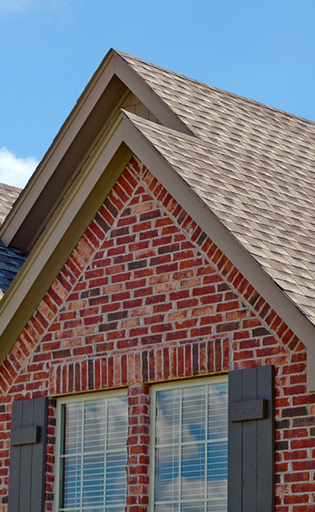What Are the Best Shingles for East Tennessee Homes?
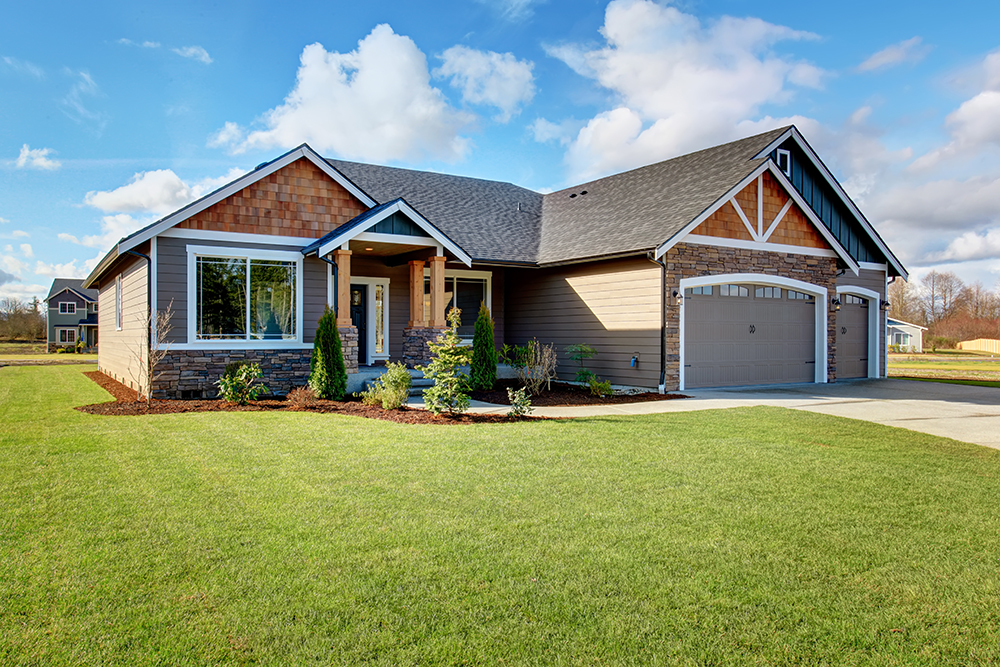
In Tennessee, the most popular shingle types are laminated shingles (otherwise known as architectural shingles) and 3-tab shingles. Architectural shingles are the better option for Tennessee homes due to their increased durability and longer lifespan. Architectural shingles will stand up to the elements in Tennessee and will need less frequent repairs. This shingle type is also roughly the same price as installing 3-tab shingles, making it the superior option.
What is the Most Common Shingles Choice for Tennessee?
Of all the materials used to make shingles, like metal, asphalt shingles are the most common used in Tennessee (and across the country for that matter). Laminate/architectural shingles are the most common type of asphalt shingles used throughout the state.
As a homeowner, you’ll want to do your homework before committing to one type of roofing material. If you have an HOA, check your HOA guidelines. These may limit the manufacturer or the color used. You don’t want to start the re-roofing process only to realize you have to completely start over with the ‘correct’ roofing type for your neighborhood.
Considerations for Choosing Roof Shingles in Tennessee
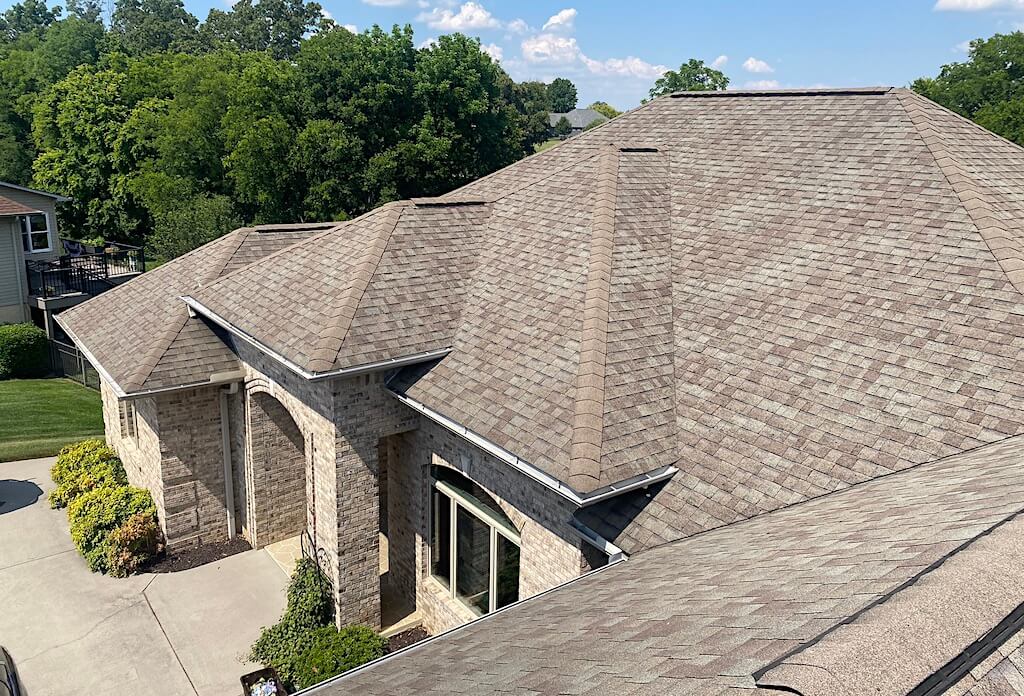
Rain, snow, and heavy wind storms are only a few of the problems homeowners must consider when selecting a shingle type for their roof. Tennessee homeowners will often face ice dams and moisture condensation as additional problems related to roof longevity. Special considerations to keep in mind when choosing a shingle type for your Tennessee home include:
Durability
Tennessee’s rain, snow, and wind storms can really be hard on roofs. This means you need to have a durable and expertly installed roof.
The way laminated shingles are installed (in one piece instead of individually), they are a superior option to three-tab shingles. And because these shingles are made by fusing multiple layers of asphalt and fiberglass, they are much more resistant to strong wind and falling objects like limbs and hail. Three-tab shingles tend to easily be ripped from roofs during heavy wind storms. So if you live in areas with high winds and you’re keen on replacing three-tab shingles after every large storm, your best option when it comes to shingles is laminated.
If you pick a roofing material that isn’t durable you could find yourself re-roofing sooner than you’d like. The lifespan of shingles isn’t as long as alternatives like tile or metal, but it is more easily repaired in the event of damage. The cost, as mentioned previously, is also much more affordable. This makes asphalt shingles an especially good option for homeowners who don’t plan to stay in the same home for more than thirty years.
Affordability
Affordability will be one of the first and most important factors to consider. Because the two most popular shingle types are similar in price, it makes sense to weight out other important factors in comparison to cost.
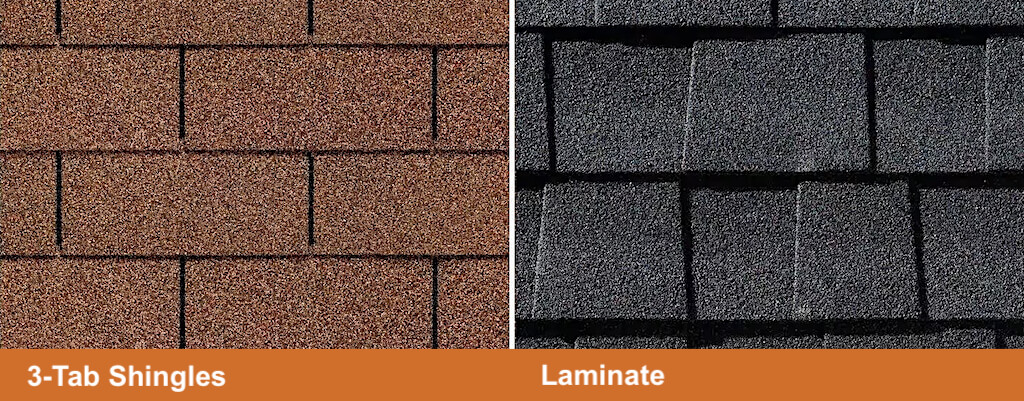
When it comes to the affordability of a type of shingle, you’ll need to consider more than just the cost of materials. The material uses to make three-tab shingles will naturally be cheaper. This is due to being 50% lighter and made of less dense material. The problem is that three-tab shingles are time-intensive to install because each shingle much be individually installed on the roof. This makes the price of installing three-tab shingles higher. In fact, some roofing contractors will end up charging the same for laminate and three-tab shingles because of the higher install time.
It’s a more financially savvy decision to spend extra on the laminated shingles than to go with the cheaper 3-tab shingles. Lamintated shingles’ durability will make the slightly higher price tag worth the cost. Whereas, if you decide to go with three-tab shingles you may find the costly, repeated repairs adding up over time.
Style and Color Variety
You won’t want to be stuck with just any roof color. Selecting a shingle type available in a variety of styles and colors will allow homeowners to pick the best style or color variety for their home. Your shingle will be on your roof for an average of 15 years — you want to love the color of your shingles.
Consider complementary shingle colors to go along with your existing house color. Most shingles will come in a variety of shades of brown, black, and gray. Brown roofs will go best with red, beige, cream, white, and brown homes. Black roofs will go best with light grey, beige, cream, white or red, homes. Gray roofs go best with red, light grey, cream, brown, white, or beige houses.
Related Reading: How to Match Roof Colors with Home Colors
Do Shingles Affect Home Temperature?

Before installing a brand new roof for energy efficiency purposes, check into upgrading your home’s AC unit, rather than the shingles installed on your roof. If you are concerned about the temperature of your home, we recommend looking into the ventilation in your attic and considering the age of your doors or windows.
After you’ve taken these preliminary measures to improve the energy-efficiency of your home, investing in energy-efficient roofing is the next step. Energy Star shingles are designed to reflect heat rather than absorb it. In a home that doesn’t use energy efficient shingles, some of the heat will be absorbed into the home. This in turn can increase the home’s temperature, making it less comfortable and increasing energy bills. With Energy Star shingles the heat is not absorbed by the roof, keeping your home cool even in the middle of a Tennessee summer.
How Long Will Shingles Last in Tennessee?
In parts of West Tennessee, where storms often pack high winds, shingles can deteriorate faster unless they’re rated for high wind resistance. High daytime temps and frequent hail storms also play a factor in how long a shingle will last.
In areas of East Tennessee like Crossville and Cookeville, they experience strong winds due to elevation changes on the Cumberland Plateau, which can shorten the life of poorly installed or “builder-grade” shingles. In mountain areas like Gatlinburg and Sevierville, homes and businessess face additional threats of wildfire making fire-resistant shingles especially important.
Plus East Tennessee can have more pronounced daily temperature fluctuations as compared to Middle and West Tennessee. The heat cycling of warn days contrasting the cold nights can shorten your shingle’s life.
Consistent and proper maintenance of your roof can help to combat deterioration from weather. Maintenance includes cleaning gutters and roofing, caulking cracked areas, and gently washing the roof surface. Some maintenance can be DIY’s by homeowners but trusting the experience of a professional roofing company is always the safest solution.
As a general rule, in Tennessee you can expect laminate shingles to last for longer than 3-tab shingles. Laminate shingles can last for up to 20 years and 3-tab shingles sometimes only lasting for 10 years before needing a full replacement. However there are premium brands with up to 50 year warranties.
Roofing Lifespans in Tennessee
-
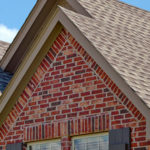 Asphalt Shingles 10 – 40 Years
Asphalt Shingles 10 – 40 YearsAsphalt shingles come in laminated and three-tab varieties. Of the two, laminated shingles have a longer lifespan. Three-tab shingles tend to have a lower lifespan due to how they’re installed.
-
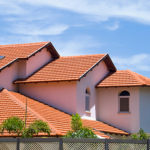 Tile Roofing 40 – 60 Years
Tile Roofing 40 – 60 YearsTile roofs are durable and have a long lifespan. But, it isn’t a good fit for every home in Tennessee due to its heavier weight. You’ll need to have a professional inspect your home prior to consideration.
-
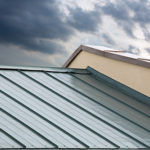 Metal Roofing 50+ Years
Metal Roofing 50+ YearsMetal roofs have the longest lifespan by far. Some brands even advertise lifetime warranties. But, they also have the highest upfront cost. These are only a good fit for those who plan to stay in the same home for a while. However, some metal roofing brands have transferable warranties.
Full Replacement vs. Repairing Single Shingles

After a major storm, you may notice you’re down a few shingles. The great thing about shingle roofs is that repairs don’t mean replacements. If you’re missing a few shingles, have a professional assess the damage and replace just the missing shingles. In most cases, shingle damage doesn’t require a replacement of the entire roof. The same can’t be said for roofing materials like metal.
Which Shingles Do We recommend?
Because we’ve been roofing in East Tennessee for so long, and tested so many brands, we have strong, experience-based feelings about which roofing shingles are the best for our area. Because of its durability-to-cost balance we suggest using Owens Corning for the best all around, upper-middle range roofing solution. Owens Corning offers a wide range of shingles at many price points, allowing us to provide you with a number of options. We like to recommend their Energy Star shingles equipped with SureNail and StreakGuard technology. This will keep you home cooler, ensure it is durable, and prevent unsightly algae buildup.
Owens Corning shingles can withstand up to 130 MPH winds and come with at least a 25-year limited or limited lifetime warranty. Its durability and quality make it a great fit for your Tennessee home.
Another brand we confidently use is TAMKO. With a broad selection of styles, impact ratings, and weather-resistant options, TAMKO shingles offer similar warranties and wind resistance as Owens Corning and are a smart choice in areas that face extreme wind, hail, or heavy rain.
As a bonus, both Owens Corning and TAMKO are made in the Southeast. The fact that they are surperior to many other brands is a wonderful, added benefit.
Have more questions about the best shingles for Tennessee?
Reach out to one of our roofing experts. We will be happy to explain the pros and cons of all our brands’s unique features and which works best for Tennessee’s regional weather needs.
Contact us
Reach out to our team to schedule your free evaluation or get your questions answered.
"Sam, Davis and the whole crew did a phenomenal job! We’ve already recommended them to our neighbors and our roof looks amazing! They worked with our insurance company and made a very stressful process much less stressful. They thoroughly cleaned up the yard of nails/debris (we have dogs so this was super important to us) and were good guys to work with. Highly recommend!"
—Keith W.
"A huge thank you, for the great job Smith Roofing did on our garage roof. Chris came out first and he explained everything to us. He was very professional and knowledgeable in his presentation to us. Joseph is over the installation, and he made sure everything was done correctly. We couldn't be happier and would recommend Smith Roofing to anyone."
—Pam C.
"Smith Roofing did an amazing job replacing our roof. Jake , our salesperson, provided a great plan and provided his expertise in choosing quality materials, and Brad came in with his crew and executed the plan to perfection. It has been a pleasure doing business with Smith Roofing. We’ve had lots of compliments on the new roof. I highly recommend choosing Smith Roofing for your roofing needs!"
—Shelly T.
"We had Smith Handyman install two screen doors and repair our roof. Paul Slack did the work and did a wonderful job. We live in an older home and nothing is square or standard. Paul was able to make the doors fit and the finished job looks great!! He was very personable and professional while working in our home. We will definitely hire Smith Handyman Service for our future needs."
John P.
"Living in an older home means many repairs! We had several small jobs that, thankfully, Smith Handyman Services were able to take care of in a timely fashion. Everything from roof repair to an older roof (while diagnosing other roof issues we might expect), resolving a plumbing issue and a toilette issue. We certainly hope to be using their services again."
Chuck A.
"I so appreciated Scott and his technician working in the dark to repair leak to make sure it was secure until weather cooperated so new roof could be put in place. I have found Smith Handyman Service to be a reputable company and recommend. Just praying for weather to cooperate so they can complete job. Scott has made me feel comfortable and kept me up to date on all job decisions. Feel like I made the right choice."
Carolyn R.

